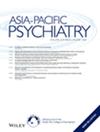Education and training in psychiatry in low- and middle-income countries during and after the COVID-19 pandemic
IF 3.4
3区 医学
Q2 PSYCHIATRY
引用次数: 2
Abstract
The World Psychiatric Association (WPA) is the largest scientific association in the mental health field, bringing together more than 250 000 psychiatrists from all over the world. It was first established in 1950, with the main aim to organize world psychiatric conferences (Fuss et al., 2019; Giallonardo, 2019; Kallivayalil, 2019; Perris, 2020; Sartorius & Sartorius, 2020). Along the decades, the association has broadened its scope to encompass educational (www.wpanet.org; Kutcher & Wei, 2020), scientific (Botbol, 2019, 2020), ethical (Herrman, 2019b), and clinical domains (Reynolds, 2020), with the final aim to improve psychiatric care for people with mental disorders (Herrman, 2019, 2020; Kallivayalil, 2020a, 2020b; Wasserman & Future, 2021) and professional development of psychiatrists (Javed, 2020; Pinto da Costa, 2020; Pinto da Costa et al., 2019). The attention devoted to education is witnessed by the presence of a Secretary for Education in the Executive Committee, whose role is to coordinate the educational activities of the WPA and to work with WPA Zonal Representatives, Member Societies, and the Secretaries of Sections and Meetings to ensure the dissemination of educational programs (Ng, 2020; Ng et al., 2019). Moreover, a specific Section on Education in Psychiatry was established in 1970, being one of the oldest WPA Scientific Sections (Fiorillo et al., 2013; Schulze, 2020a; Schulze, 2020b). The WPA has also an educational portal on its website (www. wpanet.org), with several materials for educators and trainees. All 70 WPA Scientific Sections are interested in education, covering basically all mental disorders (Cohen et al., 2019), therapeutic approaches (Linardon et al., 2019; Naeem et al., 2020), at-risk populations (Bertelli et al., 2020; Wasserman et al., 2021), and diagnostic techniques (Giordano & Borgwardt, 2019; Torous et al., 2020). In this special issue of Asia-Pacific Psychiatry, the WPA Section on Education in Psychiatry has collected contributions from researchers and scholars from different parts of the world, specifically focusing on the quality of training in lowand middle-income countries (LMICs) (Kallyvayallil & Enara, 2021). This issue includes also the views of early career psychiatrists on difficulties and advantages of being trained in psychiatry in LMICs (El Halabi et al., 2021; Mihai et al., 2021; Giurgiuca et al., 2021; Sahadevan et al., 2021). A specific paper deals with education on addiction psychiatry, a neglected topic in the scientific literature, but which is particularly relevant for psychiatric practice in LMICs (Balhara et al., 2021). The impact of the COVID-19 pandemic on training and education in psychiatry (Fiorillo & Gorwood, 2020; Gorwood & Fiorillo, 2021; Kuzman et al., 2020; Wasserman et al., 2020), which has been particularly significant in LMICs (Banerjee et al., 2020; De Sousa et al., 2020; Javed et al., 2021), has been further analyzed by Kalayasiri and Wainipitapong (2021). The results of an online survey carried out by the WPA Section on Education in Psychiatry under the supervision of the WPA President Elect, Prof. Danuta Wasserman, on the actual educational needs of Member Societies and WPA Zones, are also presented (Sampogna et al., 2021). The results of the first online edition of the train-the-trainer workshop, carried out by the WPA Section on Education in Psychiatry, which has brought together more than 100 participants from different parts of the world, are discussed by Baessler et al. (2021). Finally, the importance of using digital resources and online platforms for facilitating and improving the dissemination of educational programs and activities worldwide, in particular in LMICs, has also been stressed (Nasir et al., 2020; Orsolini et al., 2021; Ouanes et al., 2021). We hope that trainees, educators, and all those involved in mental health will join us in reading this special issue, and we are particularly grateful to the Editor, Prof. Allan Tasman, former Chair of the WPA Section on Education in Psychiatry and former Secretary for Education of the WPA, for making this endeavor possible.在COVID-19大流行期间和之后,低收入和中等收入国家的精神病学教育和培训
世界精神病学协会(WPA)是心理健康领域最大的科学协会,汇集了来自世界各地的25万多名精神科医生。它最初成立于1950年,主要目的是组织世界精神病学会议(Fuss et al., 2019;Giallonardo, 2019;Kallivayalil, 2019;Perris, 2020;缝匠肌,缝匠肌,2020)。几十年来,该协会已将其范围扩大到教育领域(www.wpanet.org;库彻,Wei, 2020),科学(Botbol, 2019, 2020),伦理(Herrman, 2019b)和临床领域(Reynolds, 2020),最终目的是改善精神障碍患者的精神护理(Herrman, 2019, 2020;植物化学学报,2020a, 2020b;沃瑟曼,未来,2021)和精神科医生的专业发展(Javed, 2020;Pinto da Costa, 2020;Pinto da Costa等人,2019)。在执行委员会中,教育秘书的存在见证了对教育的关注,他的作用是协调WPA的教育活动,并与WPA地区代表、会员协会、部门和会议秘书合作,以确保教育计划的传播(Ng, 2020;Ng et al., 2019)。此外,1970年成立了一个专门的精神病学教育部门,这是WPA最古老的科学部门之一(Fiorillo等人,2013;舒尔茨,2020;舒尔茨,2020 b)。WPA在其网站(www.wpanet.org)上也有一个教育门户网站,其中有一些供教育工作者和受训人员使用的材料。所有70个WPA科学部门都对教育感兴趣,基本上涵盖了所有精神障碍(Cohen等人,2019),治疗方法(Linardon等人,2019;Naeem et al., 2020),高危人群(Bertelli et al., 2020;Wasserman et al., 2021)和诊断技术(Giordano &Borgwardt, 2019;Torous et al., 2020)。在本期《亚太精神病学》特刊中,WPA精神病学教育部分收集了来自世界各地的研究人员和学者的文章,特别关注中低收入国家(LMICs)的培训质量(kallyvayalll &Enara, 2021)。这一问题还包括早期职业精神科医生对中低收入国家接受精神病学培训的困难和优势的看法(El Halabi et al., 2021;Mihai et al., 2021;Giurgiuca等人,2021;Sahadevan et al., 2021)。一篇专门的论文涉及成瘾精神病学的教育,这是科学文献中一个被忽视的话题,但它与中低收入国家的精神病学实践特别相关(Balhara et al., 2021)。COVID-19大流行对精神病学培训和教育的影响(Fiorillo &Gorwood, 2020;Gorwood,Fiorillo称,通常情况下2021;Kuzman et al., 2020;Wasserman et al., 2020),这在中低收入国家尤为重要(Banerjee et al., 2020;De Sousa et al., 2020;Javed et al., 2021), Kalayasiri和Wainipitapong(2021)对此进行了进一步分析。在WPA当选主席Danuta Wasserman教授的监督下,WPA精神病学教育部门进行了一项关于会员协会和WPA区域实际教育需求的在线调查,结果也被呈现出来(Sampogna et al., 2021)。Baessler等人(2021)讨论了由WPA精神病学教育部门开展的第一次在线培训师研讨会的结果,该研讨会汇集了来自世界各地的100多名参与者。最后,还强调了使用数字资源和在线平台促进和改善全球教育计划和活动传播的重要性,特别是在中低收入国家(Nasir等人,2020;Orsolini et al., 2021;Ouanes et al., 2021)。我们希望学员、教育工作者和所有与心理健康有关的人都能和我们一起阅读这期特刊,我们特别感谢编辑Allan Tasman教授,他是WPA精神病学教育部门的前主席和WPA前教育秘书,他使这一努力成为可能。
本文章由计算机程序翻译,如有差异,请以英文原文为准。
求助全文
约1分钟内获得全文
求助全文
来源期刊

Asia‐Pacific Psychiatry
PSYCHIATRY-
CiteScore
7.80
自引率
0.00%
发文量
17
审稿时长
>12 weeks
期刊介绍:
Asia-Pacific Psychiatry is an international psychiatric journal focused on the Asia and Pacific Rim region, and is the official journal of the Pacific Rim College of Psychiatrics. Asia-Pacific Psychiatry enables psychiatric and other mental health professionals in the region to share their research, education programs and clinical experience with a larger international readership. The journal offers a venue for high quality research for and from the region in the face of minimal international publication availability for authors concerned with the region. This includes findings highlighting the diversity in psychiatric behaviour, treatment and outcome related to social, ethnic, cultural and economic differences of the region. The journal publishes peer-reviewed articles and reviews, as well as clinically and educationally focused papers on regional best practices. Images, videos, a young psychiatrist''s corner, meeting reports, a journal club and contextual commentaries differentiate this journal from existing main stream psychiatry journals that are focused on other regions, or nationally focused within countries of Asia and the Pacific Rim.
 求助内容:
求助内容: 应助结果提醒方式:
应助结果提醒方式:


